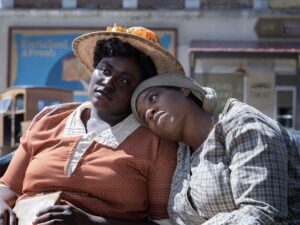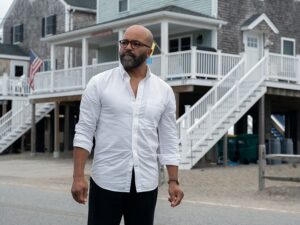Much of the efforts of the postwar civil rights and Black Power movements focused on restoring dignity to the Black male, who had been emasculated by slavery and the subsequent decades of white terror. Black women and their suffering were a corollary to that. Alice Walker’s celebrated 1982 epistolary novel, The Color Purple, went a long way toward acknowledging that imbalance. In Walker’s story, Black women were not only degraded by the history of slavery and racism, they were also vulnerable to horrific abuse from Black men.

In the book, Celie, a young girl in rural Georgia in the early 1900s, is beaten and raped by her father (a man she later discovers is her stepfather), bearing two of his children only to have them taken away as babies. She is then handed over to a man she calls Mister to be his bedmate and beast of burden. The saving grace of her years of physical and mental abuse come from her romantic relationship with Shug, a singing star and Mister’s lover; her friendship with Sofia, the tough wife of Mister’s son Harpo; and her memories of her sister Nettie, who, unbeknownst to her, has gone to Africa with the missionaries who adopted Celie’s children. Through letters sent back and forth over many years of desperate enduring, Walker traces Celie’s survival and triumph through the power of sisterhood and her growing self-worth.
The Color Purple won a Pulitzer Prize — Walker was the first Black woman to receive that honor — and it was adapted by Steven Spielberg into a 1985 film starring Whoopi Goldberg as Celie, Danny Glover as Mister, and, notably, a young Oprah Winfrey as Sofia. Though it was nominated for 11 Oscars, it won none, and some speculated that its frank depiction of Black women’s victimization at the hands of Black men had something to do with it.
With Winfrey’s backing, the book was then adapted into a Broadway musical, first in 2005 (middling reviews, hefty box office), then again in a Tony-winning revival in 2015. And now, with Winfrey and Spielberg as producers, the musical has been made into a film, directed by Ghanaian filmmaker Blitz Bazawule. Fantasia Barrino stars as Celie; a sly, effervescent Taraji P. Henson plays Shug; Danielle Brooks is hotheaded Sofia; and Colman Domingo plays the tyrannical Mister.
The film, which opened in theaters over the holidays, is moving and tastefully packaged, with fine performances and nicely choreographed dance numbers. The musical leaves out the African parts of the novel and moves swiftly through the decades of Celie’s journey. The songs have an anachronistically deep-bass, rhythm-and-blues sound to them, and the dance sequences are quick-cut in music-video style, but the film does a decent job of bringing a theatrical production to backwoods Georgia. The demands of stage and screen may have diluted the literary integrity of Walker’s novel, but the gist of her message still comes through clearly.
Literary integrity is at the heart of American Fiction, a film now playing in theaters. It chronicles the twisted fate of Thelonious “Monk” Ellison, an iconoclastic African American college professor in Boston and author of fairly obscure highbrow novels. Monk, played with marvelous low-key intensity by Jeffrey Wright, keeps bumping up against political correctness in the classroom and racial stereotypes in the literary marketplace. Incensed by the media attention given to We’s Lives in da Ghetto, a new book on Black life by a fellow academician, he embarks on writing his own version of a stereotypical Black novel as a joke and calls it My Pafology. It’s filled with lurid crime and sex in the language of the streets, and Monk submits it under a pseudonym, Stagg R. Leigh.

The joke turns out to be on Monk, however, because My Pafology (soon retitled Fuck), turns out to be a huge bestseller that nabs a multimillion-dollar film deal. The more he tries to push his stunt to the point of absurdity, the more it succeeds, and the complications of his duplicity build to an award-ceremony climax.
American Fiction is the directorial debut of Cord Jefferson, who also wrote the screenplay based on the novel Erasure by Percival Everett, but it feels thoroughly accomplished. The satire and characterizations aren’t hyped or exaggerated for belly laughs — the movie doesn’t play like a Saturday Night Live sketch or a sitcom. Instead, it delves deeply into Monk’s Black bourgeois world and emotionally distant lifestyle, including his relationships with his family and the woman he starts dating. Tracee Ellis Ross does a short but sweet turn as his sister, a doctor, and Sterling K. Brown is sharp and funny as Monk’s hunky younger brother, also a doctor, who has left his wife and kids to live freely as a gay man. The once bubbly Leslie Uggams is a revelation as the dour and imperious family matriarch who is showing symptoms of Alzheimer’s.
The scenes at the family’s Scituate beach house have a strong New England flavor, and Monk’s dealings inside the publishing world feel authentic despite being oversimplified for the moviegoing public. American Fiction is a character study of a man who likes to hide behind the characters he creates, and it offers a dollop of personal and professional truth.
All of Us Strangers, which opened at the Waters Edge Cinema last Friday, is also about a writer, this one of Irish descent living in London. Adam (Andrew Scott) is starting on a screenplay about his childhood, which was violently cut short when his parents were killed in a car crash. He ventures back to his family’s home in the suburbs and lives out conversations with the ghosts of his parents, younger than he is now and played beautifully by Jamie Bell and Claire Foy. It’s an exercise in lost time: he comes out to them, deals with their surprise and disappointment, and patiently explains the differences in LGBTQ life 30 years in their future. In the process, he comes to terms with his own loneliness and his inability to love.

Adam lives in a new high-rise outside downtown — so new it’s nearly unoccupied — and as he embarks on his screenplay he gets visited by another tenant in the building, Harry (Paul Mescal). Harry notices him during a fire alarm evacuation and comes by with a bottle of whiskey, wondering if Adam might be interested in sharing it. Adam declines, but over the next few days, he relents and hooks up with Harry. They share stories of their past, ghosts and all. Can they brook the obstacles to intimacy? The movie blends hope and pessimism so indelibly, it’s hard to know and wrong to predict.
All of Us Strangers is directed by Andrew Haigh, who is best known for the British films Weekend (about an extended gay sexual encounter) and 45 Years (about an elderly married couple having doubts about their love), and the HBO series Looking, which followed the amorous adventures of three gay men in San Francisco. He also wrote the screenplay for All of Us Strangers, based on the Japanese novel Strangers, by Taichi Yamada.
The movie is reminiscent of both Weekend and 45 Years in its exploration of how gay men deal with attraction and how tragedies of the past leave inescapable scars. As open as Haigh gets with sex and emotions, his films are largely quiet and removed. Both Scott and Pascal deliver winning portrayals, but they speak tentatively, leaving much unsaid and unexplained. Still, by mixing ghosts with real people, Haigh manages to heighten the psychological drama without noise. Watching All of Us Strangers is an intense, profoundly sad experience.



